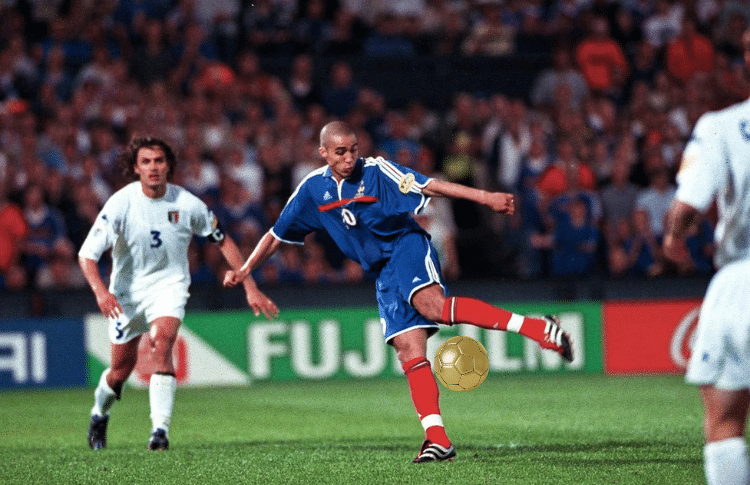What is a Golden Goal in Soccer?
What is a golden goal in soccer? A golden goal is a rule that’s used in soccer to decide a winner in a tie game.
It’s typically used in knockout games, such as the quarterfinals, semifinals, and finals of a tournament. If the game is tied at the end of regulation time, the teams will play an additional period of time, called extra time. The first team to score a goal during extra time wins the game, and that goal is known as the golden goal.

The golden goal rule has been used in various soccer tournaments over the years, including the World Cup. While it’s not used as much today, it’s still an important part of soccer history and has had a significant impact on some of the biggest games in the sport.
In this article, we’ll provide a background and some historical examples of a golden goal in soccer.
Definition & Origins of the Golden Goal
By loose definition, the golden goal rule is a format that states that the first team to score a goal in extra time is the winner. The golden goal is the first and only goal that is scored in extra time, immediately concluding the game.
The golden goal rule was introduced by FIFA in 1993 along with the rule change because the alternative term, “sudden death,” was perceived to have negative connotations. Although the golden goal format was used in North American professional association football leagues as early as the 1970s, FIFA competitions made it more popular. However, the golden goal rule was abandoned in 2003, and now no major soccer tournament uses this rule.
The golden goal rule was created to avoid penalty shootouts, which can be a tense and unpredictable way to decide a winner. The rule made teams more aggressive in their approach to extra time, as they knew that one goal could win the game.
Honestly, I think the golden goal rule added more excitement and drama to the game.
Golden Goal in Major Soccer Tournaments
In major soccer tournaments such as the FIFA World Cup, the golden goal rule was used to decide the winner of a match that ended in a draw during the knockout stages.
The use of the golden goal rule in major soccer tournaments was a controversial issue. While some believed that it added excitement and drama to the matches, others argued that it placed too much pressure on the players and could lead to defensive tactics that stifled the game.
Despite its controversial nature, the golden goal rule produced some memorable moments in soccer history. One of the most famous examples was in the final of the 2000 European Championship, where France defeated Italy with a golden goal scored by David Trezeguet. Just like that, the game was over.
Famous Golden Goal Moments
Golden goal moments have been etched in the history of soccer. These moments have produced some of the most exciting and dramatic finishes in the sport. Here are some of the most famous golden goal moments in soccer history:
- UEFA Euro 2000 Final: The final between France and Italy was tied at 1-1 in extra time. In the 103rd minute, David Trezeguet scored the golden goal to give France the victory and the championship.
- FIFA World Cup 2002 Round of 16: South Korea faced Italy in a tense match that ended 1-1 after extra time. In the 117th minute, Ahn Jung-hwan scored the golden goal to send South Korea to the quarter-finals.
- UEFA Euro 1996 Semi-Final: England faced Germany in a thrilling match that was tied at 1-1 after extra time. In the 109th minute, Alan Shearer scored the golden goal to send England to the final.
- FIFA World Cup 1998 Round of 16: In a match between Argentina and England, the score was tied at 2-2 after extra time. In the 108th minute, David Beckham was sent off for a foul, and in the 113th minute, Michael Owen scored the golden goal to give England the victory.
- UEFA Euro 2004 Quarter-Final: Greece faced France in a match that was tied at 1-1 after extra time. In the 105th minute, Angelos Basinas scored the golden goal to send Greece to the semi-finals.
End of the Golden Goal Rule
The Golden Goal rule was introduced in the 1990s by FIFA to promote more attacking play and to prevent games from going into penalty shootouts.
The decision to end the Golden Goal rule was made after a meeting of the International Football Association Board (IFAB), which is responsible for making the rules of the game. The IFAB decided that the rule was not achieving its intended purpose and was causing more problems than it solved.
Since the end of the Golden Goal rule, extra time in soccer matches is played in two halves of 15 minutes each, and the game continues until the end of the second half, regardless of whether a goal is scored. If the scores are still tied at the end of extra time, the match is decided by a penalty shootout.

Written By: SoccerNovo
SoccerNovo is an independent youth soccer media brand built to help parents, players, and coaches better understand the game and the pathways available in U.S. soccer. Our mission is to make youth soccer simpler, clearer, and more accessible for everyone involved in it.
Let’s connect




